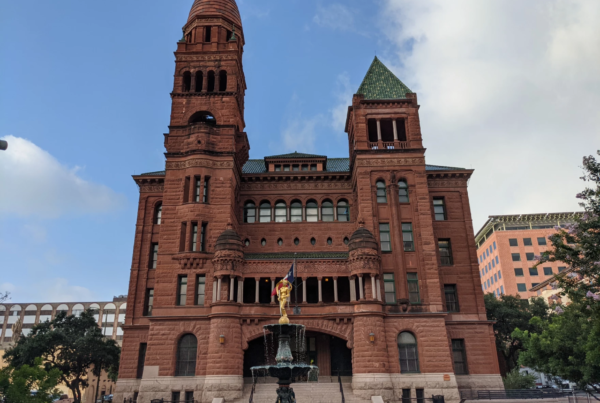“If we’re measuring Texas’ mark on American culture, specifically through music, it’s hard to make an argument that any other territory comes close to the Lone Star State’s impact.”
That’s the thesis of an article by veteran music journalist Joe Bosso in the latest edition of Guitar World Magazine – a list of the 32 greatest Texas guitarists of all time.
Bosso told Texas Standard that many of the players on the list – Stevie Ray Vaughan, Willie Nelson, Johnny Winter, Billy Gibbons – are household names. But plenty of others are less well-known, earning their spots on the list because of sheer musicianship, innovation or genre-defining presence. Listen to the interview above or read the transcript below.
This transcript has been edited lightly for clarity:
Texas Standard: What got you interested in counting down the Texas guitarists from 1 to 32? Aren’t you in New Jersey or something?
Joe Bosso: I am in New Jersey. Well, first off, I’m a longtime writer for Guitar World – former editor back in the late 80s and early 90s. So I’m very aware of all guitarists, but particularly from Texas. Man, I had some really great conversations with Stevie Ray Vaughan back in the day. And I mean, obviously he looms large in our list here. He’s obviously one of the most iconic and influential guitarists ever. He’s one of the big ones.
He’s one of the big ones, and obviously one of the names you’d expect to see on a list like this. And of course, Billy Gibbons, a famous blues-oriented player out of a ZZ Top; Willie Nelson; Freddie King; Eric Johnson; Dimebag Darrell, who is from Pantera out of the Dallas-Fort Worth area. But some of these other names may surprise people, in part because they’re somewhat less well known, unless you’re a guitar player. Dave Grissom – tell us a little bit about why he is on this list.
Dave Grissom to me is like the guy you want in your band. And when I say the guy you want in your band, that could be any band, you know. “Versatile” is a term that’s thrown around way too much. But in terms of Dave Grissom, he’s versatile, but yet he’s authentic, no matter what he’s playing. He can play jazz. He can play country. He did a long stint with Joe Ely and with John Mellencamp and fits right in. He’s one of those guys – I mean, if you are forming a band, you know, you’d want Dave Grissom.
Yeah, I’ve heard him sort of described as a guitar player’s guitar player in a sense; I think he has his own signature guitar, for example. There’s another name on this list: Trini Lopez, a big star in the 60s and 70s. Why does he belong on this list?
Well, he’s not so much what you would call a virtuoso player, but in the 60s, he popularized the guitar a little bit before the Beatles. He had obviously the big hit with Pete Seeger’s “If I Had a Hammer,” and he had his own hits, like “Lemon Tree.” Now he’s more of what I would call a strummer. He doesn’t play a lot of searing leads, but he was like the face and the guitar, and he had his own signature guitar.
In fact if you’ve ever seen the Foo Fighters, you might have seen that Trini Lopez guitar in the hands of Dave Grohl.
Dave Grohl loves that guitar. Plays it a whole bunch. So the thing is, you have to remember, back then, we didn’t have 4,000 TV channels. We had three. So if you turned on the TV and there was Trini Lopez playing guitar, millions of people saw him in the same night. So he became a very influential guitar player just because he was there. And he became a pretty good actor, too.
Your list gives a lot of Texas-born blues players their due. Johnny “Guitar” Watson out of Houston – he really started turning folks on back in the 50s. Could you say more about what kind of player he was?
You know, it’s like if you ever wanted to know what the devil might sound like playing the guitar, I think you might want to look up Johnny “Guitar” Watson. And in fact, he got some guff from his grandfather, who didn’t want him to play that “devil’s music.” But he went ahead and did so. And the thing about his playing was, again, there’s terms like “fiery.” But when you would hear his attack on the guitar, it was punchy; it was jolting. It came right at you. I think like it’s sort of a fuselage of bullets. There was no way his guitar sound was going to get lost in the mix. He was flamboyant. What he did came right at you. And so obviously, he was pretty influential.
A lot of people tried to style their own, when it comes to the sort of sonic impact they had, Johnny “Guitar” Watson riffs in the back of their heads.
Well, Frank Zappa was very, very, very inspired by Johnny “Guitar” Watson.
I want to get back to the fact that, obviously, Stevie Ray Vaughan is on this list. His brother, Jimmie Vaughan, makes this list as well – a lot of people are wishing him well; he recently was hospitalized for a procedure and apparently is doing pretty well. I want to mention another player on the list with some pretty famous musical relatives: Doyle Bramhall II, who is a founder of the Arc Angels. He toured with Fabulous T-Birds as well, right?
He did. He’s another one of those guys that I would say, you want him in your band. He of course, formed his own band, the Arc Angels, with another Texas guy, Charlie Sexton. He’s a guy who’s played with everybody – Sheryl Crow, Elton John. And then he did a long stint with Roger Waters. Now, so he’s got to fill some big shoes, playing David Gilmour’s parts. But he was able to do so in a way that you still felt some Doyle Bramhall coming in there. And that’s a hard thing to do. You know, he’s a very, very melodic player – fluid soloing, amazing tone, just a really well-rounded, schooled player.
I want to talk about one of the artists who has been cited by many contemporary musicians as one of the most creative and artistically interesting and surprising players out there, and I believe she’s the only woman on this list: Annie Clark goes by the name of St. Vincent on stage. Tell us a little bit about her.
Annie Clark. It’s like, she comes from Texas, but she might come from outer space.
Right. I know what you’re saying. David Byrne from the Talking Heads was a collaborator for a long time.
The guitar has been around for so long, and you start to think like, well, everything’s been done. We’ve gotten every sound, every approach out of it. But Annie Clark, I feel like she’s got a little bit of The Edge [from U2] in her. It’s not so much about scales and this mode, that kind of thing. She hears pure sound. She plays sometimes in a very percussive manner. What she’s able to do with guitar harmonics is just deeply affecting, deeply musical. It’s not a cheap effect. It’s part of her music. It’s part of her sound. And she can do anything from electronica to indie rock, jazz and pop. She really, really is an incredible mind on the guitar.
As I look over some of these names – and I know folks are going to want to check this out – I think a lot of people will say, “well, why these 32?” What did you have as a sort of criterion for this?
That’s a really good question. And to be honest, it could have been 50. It probably could have been 100. We had to end it somewhere. You know, sometimes it’s just pure, pure gut. I mean, obviously, there’s people who are a given – Stevie Ray, Dimebag, Johnny Winter, Billy Gibbons. But then you look at people who really kind of move the needle in their own way. A lot of times it’s simply, did this person make a mark in in some way, some sort of significant way that we can really point to?
What’s the reaction been like from readers? Have you been getting any pushback on who’s on your list and who’s not?
Mostly the response has been phenomenal – a really beautiful response. Absolutely people come to us and you know, “why not so-and-so.” That was to be expected a little bit. And that’s OK. Everyone’s got their favorites. Maybe we’ll do a part two.
Correction: This story has been updated to say that Joe Bosso was an editor for Guitar World in the early 90s.
















